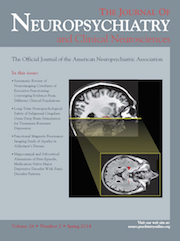To the Editor: Agitation is a common, difficult to treat complication of dementing disorders. Optimal management of agitation consists of treatment of precipitants of agitation, including undiagnosed medical problems, pain, drug toxicity, environmental triggers, poor sleep, delirium, and depression.
1 When precipitants of agitation are either absent or successfully treated, pharmacological treatment may target the syndrome of agitation. Antipsychotic agents are recommended as the first line treatment for this purpose. However, antipsychotic drugs have modest efficacy
2 and entail safety concerns including orthostasis, drowsiness, extrapyramidal syndromes, incoordination, metabolic syndrome, prolonged QTc in EKG, and cerebrovascular events.
3 Antidepressants have received limited attention in the treatment of agitation of dementia. A controlled trial of demented patients psychiatrically hospitalized for agitation showed that citalopram and perphenazine were superior to placebo and found no difference in the efficacy of the two psychotropic agents.
4 A more recent study showed that citalopram had equal efficacy with risperidone in demented patients who required psychiatric inpatient care because of agitation.
5We recently successfully treated with citalopram two agitated, delusional, nondepressed, demented patients who had failed several trials of antipsychotics. Our first patient was an 84-year-old woman with a mixed Alzheimer’s/vascular dementia who was acutely hospitalized because of physical aggression and the somatic delusion that her organs were being moved around in her body. Trials of risperidone, haloperidol, and quetiapine led to equivalent response, while lorazepam worsened her agitation. On admission, risperidone was replaced with citalopram 10 mg twice daily and increased to 15 mg twice daily. Within 72 hours, the agitation diminished dramatically, and the patient was discharged soon thereafter. On follow-up several weeks after discharge, we found that she remained in good behavioral control.
The second patient was an 80-year-old woman with Alzheimer’s dementia who presented with violent behavior and paranoia. She had failed trials of atypical and typical antipsychotics. She was initially treated with risperidone but showed no improvement. She was switched to citalopram 10 mg twice daily, which was later increased to 15 mg twice daily. Her agitation and paranoia improved 4 days after starting citalopram and remained agitation free throughout the hospitalization and several weeks after discharge.
What is interesting about the above cases is that citalopram reduced agitation in nondepressed, demented patients with delusions and paranoia. Combined with earlier studies, this observation suggests that citalopram may be a reasonable treatment option for nondepressed, delusional, agitated, demented patients that do not share the side effects of antipsychotic agents.

